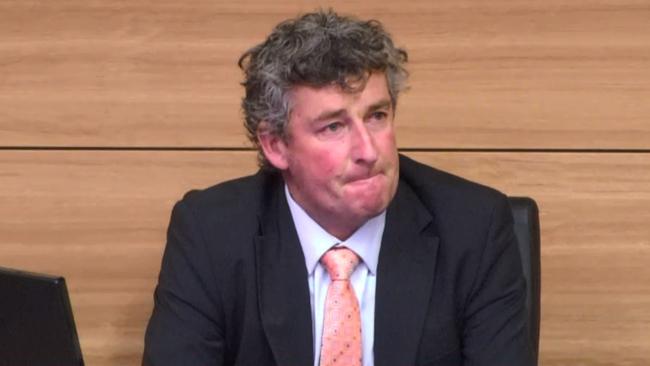Banking royal commission: Tasmanian farmer Michael Hirst blames ANZ for ‘losing everything’
A Tasmanian farmer has told the bank inquiry he was “pumped up” by ANZ and then “belted to bits for five years”.
A Tasmanian farmer has recounted how he was “pumped up”, fine-dined and “groomed” by the ANZ Bank to increase his loans and expand — and then how, within three weeks, he had his accounts frozen and was on the path to financial ruin.
Sheep, cropping and tree farmer Michael Hirst became the first primary producer to tell his sorry story to the banking royal commission this morning and made it clear he blamed wrongdoing by the ANZ for making his family financially destitute.
Mr Hirst, his wife Dimity and four children were all left with nothing when ANZ sold their five farms at below valuation in 2012 after changing the way the bank viewed farm loans made earlier by Landmark, a business it acquired in 2010.
In early 2011, the Hirsts were taken out to an expensive Launceston restaurant by visiting ANZ executives, assured “nothing would change” now the bank had taken over the former Landmark loans and told the ANZ liked their business and wanted to “see more of us.”
On August 2, 2011, the ANZ offered to increase loans made to the Hirsts, valuing their five farms at $7.75m.
Two weeks later, their accounts were frozen, they were told “to put the cheque book away” and informed they would be forced to sell their farms to repay debt because the ANZ only lent funds based on cash flow, not a property’s tree plantation land block sales.
They were told their farms had just been revalued downwards as only worth $4.7 million — 40 per cent less that 12 days earlier
“Up till that point the ANZ had supported us the hilt, told us we were a very good business, groomed us; then they turned and smashed us to bits,” an emotional Mr Hirst told the royal commission hearings into farm finances in Brisbane this morning.
“(There is) no doubt in my mind the bank and its wrongdoings made us lose everything; not once in eight years have they have shown us any empathy or compassion, and they have never apologised.”

Mr Hirst stumbled and broke down when asked by his lawyer before the Commission if the family legally challenged the ANZ’s determination to force them off their farms and the properties then sold to repay the bank’s debt.
“I was working quite hard, driving a truck, and my wife was in bed (with depression and a nervous breakdown); we didn’t have any resources to challenge (the bank),” Mr Hirst haltingly said.
“At that time we were compliant; from what we’d been told we felt then like this was all our fault — but that view has changed greatly over the years.”
The Commission was told by ANZ head of commercial lending services, Ben Steinberg, that in 2015 an independent review of the Hirsts case by a former High Court judge — called in after ANZ was trying to stem negative publicity about its farm lending — revealed serious banking errors and misconduct in the way the Hirsts had been dealt with.
It found the ANZ had not offered debt mediation, overvalued farms and offered bigger loans, unduly hiked interest rates, had been overly tough and aggressive towards the Hirsts in bank meetings, all of which breached community standards of fairness and reasonableness.
The Hirsts were eventually compensated with $684,00 in 2017.
Mr Steinberg said yesterday that the bank acknowledged it had not met community standards in this instance. But he denied misconduct or breaches of the banking code.
Mr Steinberg also made the first public apology by the ANZ to the Hirsts today in the Commission hearings.






To join the conversation, please log in. Don't have an account? Register
Join the conversation, you are commenting as Logout